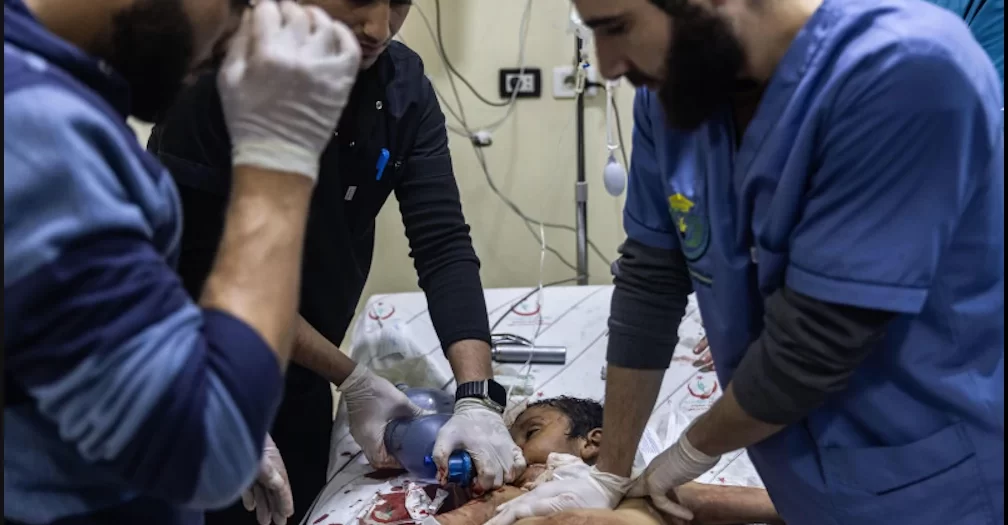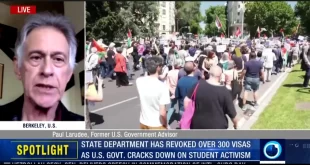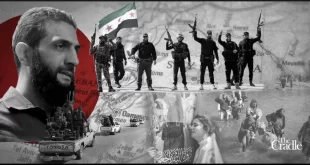by Susan Dirgham, published on Pearls and Irritations, December 22, 2023
‘In the document drawn up by a top secret and high-level working group that met in Washington in September 1957, Mr Macmillan and President Eisenhower were left in no doubt about the need to assassinate the top men in Damascus.’‘Documents show White House and No 10 conspired over oil-fuelled invasion plan’, The Guardian, 27 Sept 2003
During times of war, when hard truths about ourselves and our ‘enemy’ are so seldom told, our naivety and credulity are exploited. The work for peace and reconciliation become nigh impossible.
Can seeking the truth and putting ourselves in the shoes of the ‘enemy’ be antidotes against the allure of war?
When I lived in pre-war Damascus, I was so often buoyed by the warmth of Syrians. The direct, engaging eye contact I so often received from students, colleagues, even waiters and shopkeepers, would have me feeling in sync with those around me; I felt accepted, at home.
’I love Syria’ was a declaration expressed by Syrians of all backgrounds: a heart-felt truth similar to that expressed by Indigenous peoples about ‘country’. Syrians’ love for country united a diverse population.
To destroy Syria, its enemies had to undermine that love. Plus, they had to undermine the intrinsic trust Syrians placed in their fellows. They had to undermine human kindness.
In the first weeks of Syria’s ‘Arab Spring’, there were random acts of terror by armed gangs. Terror engendered chaos and fear; it sowed hatred and distrust. It inevitably fuelled violence and led to war.
By 2013, the ‘armed groups’ were well-funded, trained and provisioned. They included thousands of foreign fighters who didn’t share Syrians’ love for ‘country’.
In June that year, parents of Tunisian ‘jihadists’ traveled to Damascus, desperate to find their sons and take them home. In the Umayyad Mosque, Muslim and Christian leaders sat together, while the Tunisian parents apologised to Syrian parents whose sons had been killed in the war.
Earlier in 2013, Sheikh Qaradawi, an Egyptian cleric described as the ‘spiritual head of the Muslim Brotherhood’ with close ties to the Qatari royal family, issued a fatwa on his Al-Jazeera program. He gave permission for insurgents to kill Syrian soldiers, civilians and religious scholars (‘sympathisers’) who still supported the ‘unjust and tyrannical authority’.
The most prominent religious scholar to be assassinated was the 84-year-old imam of the Umayyad Mosque, Sheikh al-Bouti, a ‘renowned Sunni Muslim scholar, writer, and professor’. He and over forty of his students were killed by a suicide bomber in March 2013.
The news of Sheikh al-Bouti’s death saddened me. On Fridays, I had often watched him present a religious lesson on Syrian TV. For me, he was the Martin Luther King of Syria: a religious figure in a horrendous situation, trying to guide with intelligence, faith and love, knowing many enemies of Syria would want him dead. He would be damned whatever he did.
Five years earlier, I had stood in the square outside the Umayyad Mosque and watched Sheikh al-Bouti accompany a prominent Christian Lebanese general – Michel Aoun – into the mosque. Sheikh al-Bouti looked slight and frail, reminding me of my maternal grandfather, a plumber from Melbourne who had once entered Damascus on horseback; then he was a loyal servant of the British Empire who knew nothing about Syria and its people.
Around the time of Sheikh al-Bouti’s assassination, a 15-year-old Christian girl, Mariam, was separated from her family during a battle over control of their hometown, al-Qusair, near the Lebanese border.
Mariam was captured by insurgents and forced into an Islamic marriage by a commander of the powerful al-Qaeda affiliated group in Syria: Jabhat al-Nusra. She was soon repudiated by the commander, and then married, raped and repudiated by a string of men. When they no longer wanted her, Mariam was killed.
The Womens International League for Peace and Freedom reported in 2013 that a Jordanian cleric’s fatwa made it ‘legal’ for ‘Muslims fighting to topple secular president Bashar Assad and install Sharia law to “capture and have sex with” all non-Sunni women.
When al-Nusra executed a mother of two in a town square in Idlib province, her execution was videoed on the smartphones of insurgents. She had been accused of adultery.
It wasn’t unusual for al-Nusra to fight alongside the West’s ‘moderate’ rebel groups, which helps explain why such vicious crimes were rarely highlighted in our mainstream media – even when there was irrefutable evidence of them.
(It would be hypocritical for Israel’s Prime Minister Netanyahu to point to such acts of terror in Syria and claim that this is what Israel faced on 7 October. The truth of events on that day might never be fully revealed; however, much is known about the terror inflicted on the people of Syria during the darkest years of the war there, and like his western allies, Netanyahu provided support to Islamist militants.)
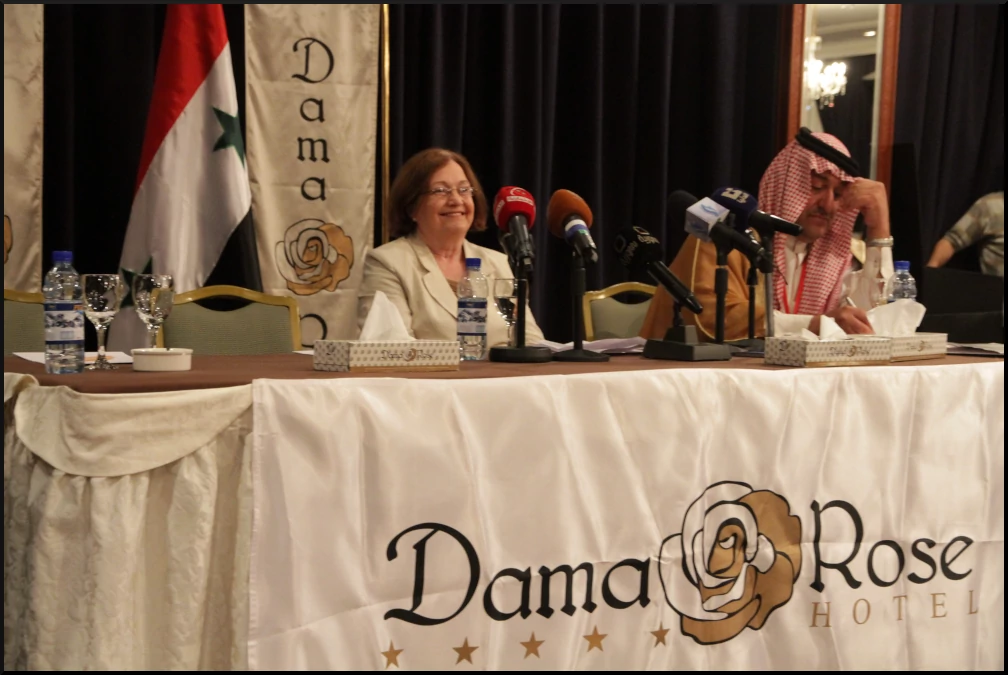
In May 2013, I was a member of an international peace delegation to Syria. It was led by Nobel Peace Laureate Mairead Maguire. At a press conference for the delegation, one young Syrian journalist asked a question. A few weeks later she was dead. Yara Abbas was shot and killed by a sniper on her way back to Damascus after reporting on the fighting in al-Qusair, Mariam’s town.
Yara was a war correspondent and, as such, would certainly have made it onto Sheikh Qaradawi’s target list: Yara had expressed her respect for Syrian soldiers.
Like most war correspondents, Yara would have understood that in war nothing is simple. She explained some of the complexity of Syria: “There are a lot of Islamists who are also rejecting these militias because they know they are not fighting for Syrian progress. Yes, there are people who are helping them, but also a lot of Islamists who are refusing this way. I saw this myself in the middle of Salaheddine (heavily contested Aleppo neighborhood). They (pious Syrians) stayed home and pray, but won’t open the door to the militias. They are scared.”
When Britain’s Joanna Lumley visited Jordan for her 2023 Spice Trail Adventure series, she met a gracious and hospitable Syrian woman in the Za’atari refugee camp. Over lunch, Ms Lumley questioned her.
“What was life in Syria like?”
“It was really beautiful, very stable.”
“What was your home like there?”
“Beautiful house, concrete. I had three rooms! And trees: olives, lemons, apricots. All you need.”
“Do you think you will go back to Syria?”
“I’d love to go back but only when Syria is safe again. We dream all the time of going back to Syria.”
It is a simple interaction, another reminder that Syrians love their country but that in war life is so much more complicated and dangerous than it is in times of peace.
Then Ms Lumley visits her “old friend” Rory Stewart in Jordan’s capital. She allows him to have the last word on Syria. Predictably, this former Eton boy, soldier, politician and colonial administrator sees the ‘regime’ as the problem. Foreign-sponsored terror is not mentioned, nor is any sympathy expressed for Syrian victims of terror.
As there had been in 1957, it is highly likely that even before the start of the ‘Arab Spring’, plans were being devised in London and Washington and other capitals for regime change in Damascus. In fact, a former French foreign minister, Roland Dumas, claimed British officials had revealed to him two years before the ‘Arab Spring’ that they were preparing to send ‘gunmen’ into Syria.
The war in Syria is a geopolitical one, and Syria and its people have been its victims.
The voices of eloquent Syrians who oppose the ‘revolution’ are generally denied a platform in Australia, which prompted me to travel to Damascus in September 2019 with a new smart phone and a journalist visa.
One of my interviewees was Madam Janset Kazan MP, whose Circassian ancestors had fled 19th century Russia for the Golan Heights.
I videoed a simple message Madam Kazan wanted to pass to Australian politicians:
“… I hope (you) come to Syria, get to know our country and meet Syrian women MPs …We hope you can stand by our side in our struggle against terrorism because women are always the ones who lose a lot….”
One person I would very much have liked to interview was Mohammad Rafea, the popular Palestinian Syrian actor who featured in the documentary: ‘Manufacturing Dissent: The Truth about Syria’.
Mohammad used the word ‘love’ in a context familiar to Syrians:
“I would like to say to all the Syrian people: live together like before; love each other like before. And … we can figure out .. a solution for our problems. Don’t let anyone from abroad to come and control us”.
Months after these words were recorded, Mohammad was abducted from his home, tortured and killed. (A prominent public figure, he had not been shy to express his support for Syria’s president, thus making himself a target for militants.)
In December 2008, when I watched Sheikh al-Bouti gently escort General Aoun into the Umayyad Mosque, I stood near ancient columns and bookstores that sold the Koran. There were decorations hanging for both Christmas and Eid, since the festivals coincided that December. The scene was indicative of an ancient country with a soul.
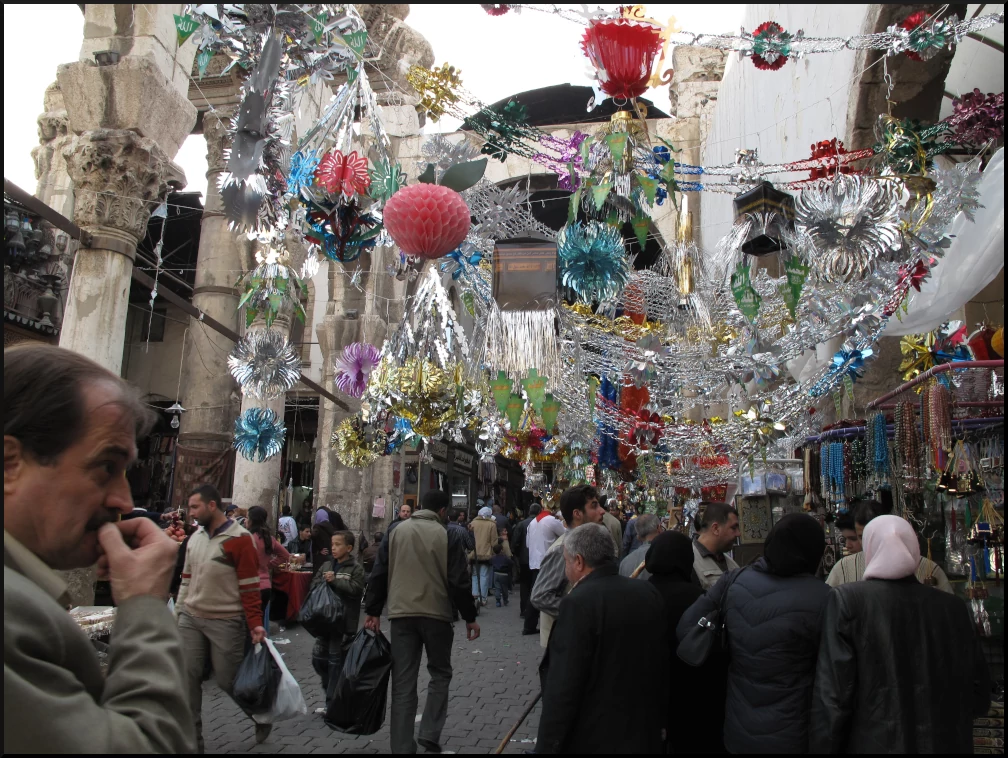
In his anti-war addresses, Martin Luther King emphasised the necessity of seeking the truth and expressed his fear that America would lose its soul, “The war in Vietnam is but a symptom of a far deeper malady within the American spirit”, he said.
I don’t believe Syria can lose its soul, just as Australia’s First Nations can’t lose theirs.
However, as long as politicians and other prominent Australians avoid seeking the difficult truths about Syria (and other wars); as long as western arrogance and greed remain the foundations of so many wars, as long as so little empathy is shown for the ‘enemy’, there will be reason to fear for Australia’s soul.
Syria has the potential to show us that there are antidotes for the allure of war.
 Syria Support Movement solidarity with the Syrian people
Syria Support Movement solidarity with the Syrian people

